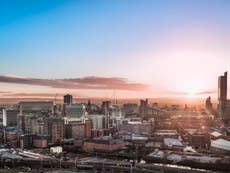I have spent a decade fighting HS2, and the arguments to support it keep getting worse
It should be obvious that moving more and more people greater distances for work is unsustainable and incompatible with the acceptance of a climate emergency
High-speed rail. It sounds like it must be a great idea doesn’t it? That’s what I thought when I first heard those three little words, but then I made the mistake of finding out a bit more.
I quickly realised that HS2 is a disastrous project arrived at in a policy vacuum, pushed forward by the firms that want to build it, and promoted with a thin veneer of arguments that make great soundbites, but do not stand up to scrutiny. So I went to a few meetings, and with a career switch that I never quite understood myself from engineering to campaigning, I got pushed to the front.
A decade of following and analysing everything HS2 related later, and I despair at how is has been allowed to survive.
With Lord Berkeley claiming HS2 is “rampant” with evidence of cost overruns, cover-ups and fraud, a £30bn over-run apparently appearing from nowhere, claims that parliament was misled, and no one seeming to know exactly where Boris Johnson stands on the project, there has been a recent flurry of attempts to justify HS2.
As ever with the project, these have differing degrees of plausibility. There are even half-hearted claims that high-speed rail isn’t really about speed but something more laudable, despite the fact the 250mph design speed dictates everything about the project: minimising functionality and flexibility, prohibiting freight, denying intermediate stops and increasing not only the cost of building the railway but also the carbon footprint, land take and damage to the environment and communities.
The most common approach is to sneer that people who oppose HS2 simply don’t understand, as it’s not about speed, but capacity. But the new HS2 tracks would provide a handful of point to point intercity journeys, the preserve of the business elite, and I believe would deliver capacity where it is needed least at the greatest cost, decades into the future and will do nothing to alleviate the vast majority of crush-hour squalor.
Proponents now claim the big point is that HS2 “frees up capacity” on existing lines, meaning more services could run on them, even though it is still not known what speed “classic-compatible” HS2 trains would run on existing tracks.
But adding new services by “freeing up capacity” is incompatible with the HS2 business case which specifically expects a net cut of £11.1bn to existing rail services, double the “cost savings” proposed back in 2010 when HS2 Ltd were honest enough to admit exactly which towns and cities would lose trains.
Whether it is actually possible to implement these cuts or “free up huge swathes of capacity” as some would have it, is by no means certain. Current inter-city services serve places that HS2 never would. Former British Rail director Chris Stokes recently demonstrated that HS2 would deliver “pretty much zero” extra capacity to Leeds or Manchester in the morning peak, as those trains arriving from the capital aren’t carrying masses of passengers who got on in London at daybreak, but people from Doncaster and Wakefield or Stoke-on-Trent, Macclesfield, Crewe and Wilmslow.
Now we are told that removing express trains could normalise train speeds on existing tracks, meaning even more capacity to take lorries off the road for freight. This is overly simplistic. In my view this could only work if you abandon the “second-tier” inter-city towns and cities bypassed by HS2 and slow down the remaining passenger trains on the current network.
The high-speed services that HS2 would partially replace run at 125mph, but “semi-fast” commuter services aren’t far behind running around 100mph, with some getting up to 110mph. With most UK freight trains limited to around 50 to 60mph, what is being suggested here is akin to the misery that would be achieved elsewhere by allowing lorries into the fast lane of motorways.
No one wants to mention the billions that would have to be found to run any new services, remembering you’d have to reverse £11bn of planned cuts just to stand still, and the official figures are based on the concept that HS2 will deliver on what in my view are grossly inflated passenger forecasts used to justify its construction and magically run at a profit, as opposed to the inevitable reality that it will suck up more subsidy into private hands.
This is why HS2 supporters carefully say it “could deliver more capacity” on the existing network, not that it “will deliver more trains”. As with so many things when it comes to HS2, that is an uncosted and unbudgeted extra. And all this is before you consider that every claim HS2 make about capacity is based on them running 18 trains per hour each way. There are examples to suggest this could be theoretically possible, but nowhere in the world gets close to it at the proposed speeds.
But there is no other way of increasing capacity, “the tracks are full”, HS2 proponents insist.
The West Coast Mainline being full is another idea that I don’t think tallies with reality. Twice since we were first told that line was “full”, timetable changes have added more services. Virgin recently issued plans to run open-access services to Liverpool on those supposedly-full tracks. It’s also amazing how many self-declared “rail experts” forget that the far-less-sexy in-cab signalling or “digital railway” as it is now called could deliver an estimated 20 per cent more capacity throughout the entire rail network with no environmental damage whatsoever.
Unfortunately the digital railway just doesn’t cost enough to generate armies of vested interest lobbyists, but it will have to happen eventually and unlike HS2 is the truly green solution. Even HS2 Ltd admit their project will increase carbon emissions. Those who claim HS2 might help reduce aviation have clearly not spotted that Birmingham, East Midlands, Leeds/Bradford and Manchester airports are all lobbying for HS2 to be built.
It should be blatantly obvious that moving more and more people greater distances for work is unsustainable and incompatible with the acceptance of a climate emergency, and like when the railways were born, technology is fundamentally changing the way we work forever.
Building HS2 now is simply standing on the wrong side of history, backing a 19th-century solution for a 21st-century world.
Joe Rukin is the Stop HS2 campaign manager




Join our commenting forum
Join thought-provoking conversations, follow other Independent readers and see their replies